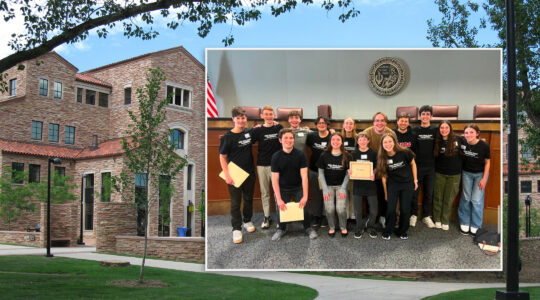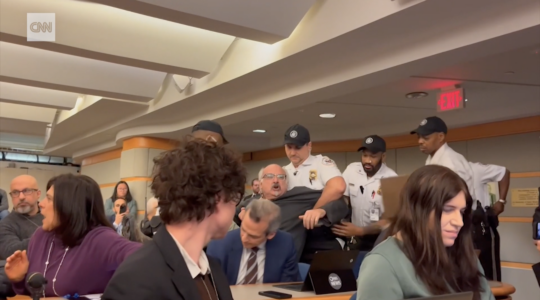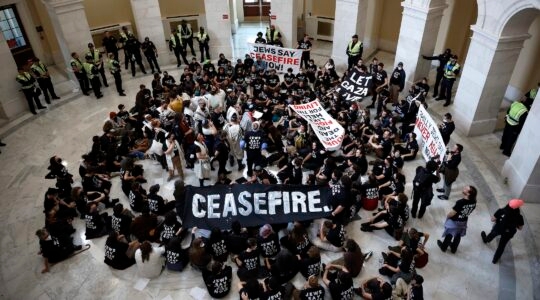
Jewish campers arrive back in the Kansas City area after being sent home from Camp Sabra in Lake of the Ozarks, Mo., after an outbreak of swine flu there, June 23, 2008. The camp closed for a seven-day disinfection. (Edmee Rodriguez)
NEW YORK (JTA) — Though no longer leading evening news reports, the swine flu — which recently was upgraded to a pandemic — has gradually but persistently been making its way into the Jewish community.
With the Jewish summer camp season about to begin, camps across the country are reporting outbreaks of the virus. Nine cases in total have been confirmed at two Jewish camps in Texas. At Ramah Darom in Clayton, Ga., roughly 100 cases of flu-like symptoms have been reported, though a spokesperson said 70 percent of those have recovered and the camp is operating normally.
Two Reform movement camps have delayed the start of the summer session due to concerns about the virus. A third movement camp has one confirmed case but is operating normally.
“The protocols we have for isolation have actually worked,” said Rabbi Elliott Kleinman, the Union for Reform Judaism’s chief program officer.
In Baltimore, the Ner Israel Rabbinical College, one of the largest Orthodox yeshivas in the country, reported five cases of the virus earlier this month. That outbreak followed news that four Brooklyn yeshivas were closing temporarily over concerns about high absenteeism due to the virus.
At least 10 participants in a recent Birthright Israel trip came down with swine flu and were quarantined — after they had infected 18 Israeli soldiers, according to the Jerusalem Post. The Birthright group also had met with Israeli President Shimon Peres, but he was tested and not infected.
Israel has had more than 130 confirmed cases of the virus, and a young girl became the first confirmed Palestinian case in the West Bank two weeks ago.
Two months after the outbreak was first identified, the swine flu virus — a variant of influenza that is fatal in a tiny fraction of cases — continues to spread.
Though seasonal flu outbreaks tend to drop off dramatically when warmer weather hits in May, the U.S. Centers for Disease Control reported higher-than-usual levels of influenza rates through the second week in June.
The disease mostly affects younger people, according to the CDC. During the academic year, schools were seen as a major breeding ground for the virus. The first New York City fatality from the virus was a Jewish public school principal from Queens.
Last week, the Foundation for Jewish Camp organized a series of conference calls with camp directors to discuss preventive measures.
Rabbi Eve Rudin, who directs the foundation’s department of camp excellence and advancement, said that approximately 10 Jewish camps have been affected by the virus, though she stressed that camps do not report to the foundation and that her information was gleaned entirely from media reports.
“I think that currently swine flu is the exception, it’s not the rule,” Rudin said.
Camp Newman-Swig, a Union for Reform Judaism camp in Santa Rosa, Calif., delayed the start of the camping season until June 25 because 25 staff members exhibited flu-like symptoms and were quarantined for seven days.
Another Reform camp, Camp Coleman in Cleveland, Ga., canceled its first session and will open July 12 after 45 of 160 staff members reported flu and flu-like symptoms. A third camp, Greene Family Camp in Bruceville, Tex., has one confirmed swine flu case but is operating normally, according to Kleinman.
“We are planning and are excited to begin camp Thursday, June 25th, and proceed with a sensational summer,” said a notice posted on Newman-Swig’s Web site. “Even if more staff and campers get sick, we are prepared to care for them and others. This situation is not unique to our camp.”
JTA has documented Jewish history in real-time for over a century. Keep our journalism strong by joining us in supporting independent, award-winning reporting.





